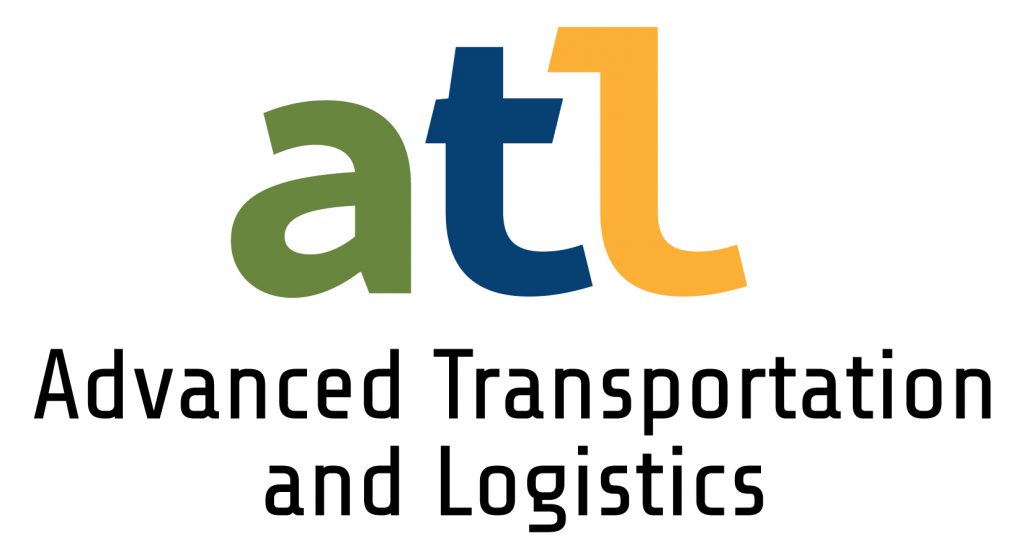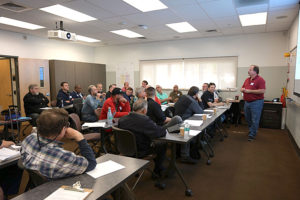
Kurt Shadbolt, Faculty at Chabot College’s BMW Program, conducting the Train-the-Trainer Advanced Driver Assistance Systems Training.
By Pam Gutman, ATL Regional Director, Bay Region
As part of the Strong Workforce Program’s (SWP), NextGen AutoTech, Regional Joint Venture (RJV) initiative for automotive in the Bay Area, Regional Director, Pam Gutman, organized and facilitated the third professional development training for automotive faculty on September 27-28, 2019.
The RJV has focused on exposing and training faculty to the new semi-autonomous and advanced electrical automotive technologies that are currently on the road today.
“Regional curricula are under development and faculty is becoming more comfortable with the new semi-autonomous and advanced electrical technologies on the road today,” Gutman said.
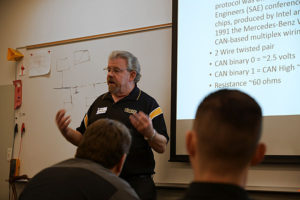
Mike Sherburne, Faculty at Chabot College’s BMW Program, teaching Automotive BUS Networks.
This third training was built on the Advanced Driver Assistance Systems (ADAS) Training that Bosch conducted in November 2018 and again at the ATL Mobilize Summit in August 2019.
Kurt Shadbolt, BMW faculty at Chabot College’s auto program, developed and conducted the ADAS Train-the-Trainer curriculum. Mike Sherburne, BMW faculty at Chabot College’s auto program, developed and conducted a lengthy training on Automotive BUS Networks. More than 30 faculty attended from the following 12 Bay Area automotive college programs:
- Chabot College
- City College of San Francisco
- College of Alameda
- Contra Costa College
- DeAnza College
- Evergreen Valley College
- Hartnell College
- Los Positas College
- Monterey Peninsula College
- Santa Rosa Jr. College
- Skyline College
- Solano College
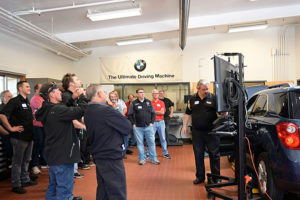
Mike Sherburne, Chabot College Faculty, BMW Program: teaching in Lab.
Bay Area automotive high school faculty was also invited, and 8 participants attended the training from the following high schools:
- Castro Valley
- Eden ROP: Mission Valley ROP
- San Benito High School
- San Leandro High School
- Pittsburg High School
Following the faculty professional development modules, the faculty discussed how they would incorporate the new ADAS and Auto/IOT regional curricula under development.
“Employers have been telling faculty that they are teaching 1990s technology and unless the programs change, they may no longer be as relevant in the coming years,” Gutman said. “Consequently, faculty is recognizing that their programs need to incorporate the new technologies, and students need to be exposed to the new technologies that are already in the cars that are on the road today.”
However, automotive faculty are challenged to find space in their already crowded two- year programs and are looking for guidance from NATEF/ASE as to what they can prune and not lose their NATEF certifications.
At the same time, some colleges are facing more austere financial environments and are prohibited from adding new programs.
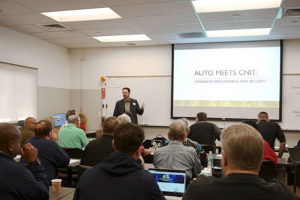
Nick Rothman, CCSF Auto Program Chair, discussing the new contextualized IOT/Auto Curriculum that is under development at CCSF and his approach to AUTO/CNIT.
To avoid creating new classes, several faculty suggested possible strategies and ways of embedding the new ADAS modules into existing auto classes. One program suggested combining existing auto classes with existing computer science/IOT classes to create an Auto/IOT certificate without creating a new IOT/AUTO course.
Faculty was actively engaged in these discussions which will be continued in the upcoming Advanced Electrical training for Bay Area faculty to be conducted by Tesla at Evergreen Valley College.
The training presentations and curriculum are posted on the ATL website: www.atleducation.org (under the Faculty tab and then under the Curriculum tab).

